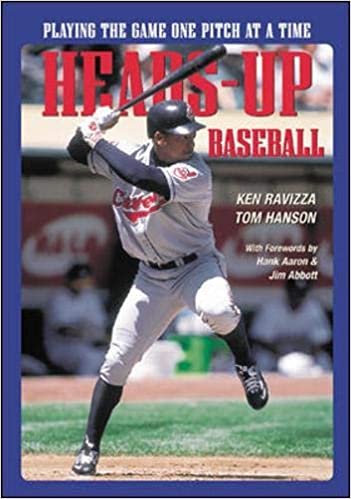
Heads-Up Baseball: Playing the Game One Pitch at a Time is a mental training book by the late Ken Ravizza and Tom Hanson.
The book is a guide to mastering the mental side of baseball, whether you are on the mound, in the batting box, or on the field.
While the book is written with baseball players in mind, it stands out as one of the best mental training books for athletes for its simplicity and ease of implementation.
The examples are simple, to the point. Worksheets and exercises are included with the material so that athletes can put the information to use immediately. And the book is short, easy to read, and void of academic jargon and generalized platitudes, making Heads-Up Baseball actionable and useful.
Here are some of the things that stood out for me while reading the book, including key quotes, passages, and some notes and thoughts of my own.

Where to Buy Heads-Up Baseball
“The goal of the mental game is to play with confidence.”
Baseball by definition is racked with failure. Even a great batter only hits 3/10 pitches. Dealing with failing and maintaining confidence in the face of almost certain failure is key.
Players who spiral out of control mentally in the batters box do so because they are “playing three pitches at a time” instead of playing pitch to pitch.
“Peak performance isn’t about being perfect, it’s about compensating and adjusting.”
Practice, repetition, and consistency is key with mental skills. Just like your physical skills, they take work. “Mental skills don’t develop overnight.”
Mindset is a choice.
There’s nothing in the rule-book that says you have to sulk if you get struck out three times. “You can’t control what happens to you, but you can control your reaction to it.”
A good mental game means having a mission and playing the game one pitch at a time.
“Your mission clarifies why you play baseball, what kind of player you want to be and what you want to accomplish in the game.”
“Playing one pitch at a time means being as confident and as focused as possible on each pitch as it is thrown.”
Playing the game one pitch at a time is broken down into three parts: being in control of yourself, having a plan (or process), and trusting yourself. These seem obvious, but rarely is it discussed how to do it.
Focus on the process.
Players often get caught up in statistics instead of how well they are executing their process. Results and outcomes matter, obviously, but they are driven by how well a player works their process. Because the outcome is often out of your control, you can only truly work your process.
Properly evaluating yourself speeds up improvement. A bad play or game “can be turned into a positive experience if you take a little time and draw a lesson or two from it.”
Practice is everything. “You can’t expect a skill to simply show up in a game if you haven’t practiced it first.”
“A player who respects the game emphasizes the quality of his practices. He can’t expect to do in a game anything he hasn’t done in practice.”
“You might think that the biggest thing your mental game needs help with is keeping your composure in the last inning of a one-run ball game, but the real focus should be on the quality of your practices.”
“If you do the work on your mental game in practice, you will be able to handle the pressure situations in games.”
“To be the best you can be, the fire must come from within. You are responsible for your own motivation.”
Clarifying your mission (aka motivation) means asking yourself why you play, what can of player you would like to be, and what you would like to accomplish.
Having a mission gives you direction and fuel when you need it. “Most players let their feelings dictate how well they play. If they feel good they think they’ll play well; when they don’t feel good, their performance usually suffers.”
“Discipline and commitment are defined as putting your mission first. You do what your mission ‘says’ you should do rather than what you feel like doing.”
“Committed athletes are driven by their purpose and not by how they happen to feel on a given day.”
Having purpose means you go from “Should I workout today?” to “When am I going to workout today?”
“Attitude is a decision.”
“Knowing why you play baseball and what you want to get out of it gives you perspective.”
Having a clear mission makes things less stressful, and reduces players attaching their self-worth to their performance on the field. “The less stress you experience, the better you play.”
“Taking 15 ground balls with game-like intensity is more valuable than taking 100 when you’re just going through the motions.”
Having fun and enjoying the game are paramount for success. “If you’re going to be good, you’ve got to be getting positive emotion from playing the game.”
“If you have fun it changes all the pressure into pleasure.” – Ken Griffey Sr.
“Sometimes you have to say to yourself that you’re going to have fun and feel good before you go out there. Normally, you have fun after you do well, but I wanted to have fun before I did well and that helped.” – Dave Winfield
The details matter. “The slightest edge can make the difference between being safe or out at first base… It’s clear that EVERYTHING IS A BIG THING.”
“Base your pride on how you approached the game or practice, not just the outcome.”
“Outcomes are important but the place you have control is in the PROCESS of playing the game. Base your evaluations on how well you ‘worked the process.’”
“Your mission becomes your attitude. It’s a decision you make on a day-to-day basis.”
When you are in control of yourself, you are confident. “It’s your responsibility to be in control of yourself.”
There are plenty of things you can’t control on the field: luck, teammates, officiating, the opponent’s ability, weather, crowd.
“Other than my at bats, I have no control over the runs we’re going to score. But I can control the pitches I make, how I handle my mechanics, how I control my frame of mind… I can’t control what happens outside of my pitching.” – Greg Maddux
Although you can’t control everything that happens, you can choose to control how you respond “to any situation on or off the field.”
“What you choose to think about largely determines how you play, so choose your thinking wisely. Choose to think about playing well!”
Changing negative reactions to adversity takes time and repetition. You are changing a habit. “Keeping your thoughts positive in the face of failure is difficult. Negative reactions to bad things are natural.”
Reacting productively towards adversity is something we can grasp intellectually, but understanding it emotionally is another.
“A pitcher can’t control his pitches unless he is in control of himself.” – Gene Mauch
Mechanics and technique are important, but if a player loses control of himself, it’s not a mechanical issue, it’s a control issue.
Deep breaths are a player’s secret weapon for more control. Helps you stay present, release tension, and check in “with yourself to see if you are in control.” Slows things down.
“Just as you can’t accurately throw three baseballs at once, you can’t be successful when you let your anger or frustration from one pitch affect your next pitch.”
“Slumps happen when hitters come to the plate carrying the weight of several ‘of-fors’ on their backs.”
When you learn to properly control yourself, you move towards being able to have trust in your abilities and skills. “Only when under control can you give up control and get to trust.”
When players encounter a yellow light situation—something happens to knock them off their game—the first instinct is to run the light. When under stress, we tend to rush and panic. The key to getting back in control is to slow things down.
Recognizing the thoughts and behaviors you produce when things are spiraling away from you mentally are the first step in reducing them.
To break free from yellow (and red!) light thoughts: Use a simple physical cue as a release (run your fingers across the brim of your hat to “wipe” or clenching your hand three times), deep breaths, slow things down (take your time).
Fake it till you make it. When you hit a dry spell, continue to carry yourself with confidence. Confident thoughts and actions produce confident results.
“You fake it. You do. The next thing you know, it works… You can’t fake a fastball, I’m not saying that, but you have to give the impression that your stuff is on time.” – Dennis Eckersley
Keep your head up, lift your chest, act with confidence, think about moments where you crushed it and imitate the body language you used then.
Plan the performance you want. Instead of outcome, plan the way you are going to attack your play or performance. “Make it simple, make it clear.”
Being in control mentally allows you think clearly about your performance plan.
Commit to the plan you decide on.
Use visualization to rehearse yourself executing your performance plans.
Visualizing right before a performance—a pitch, an at-bat, a defensive play—keeps you focused and blocks out distractions, including what’s happening in the stands or if you just threw a bad pitch.
To block out distracting thoughts, focus on something else. “A distraction is blocked out indirectly by focusing so intently on something else that the distraction is pushed out by your awareness. The key is to figure out what you should pay attention to and get really good at focusing on it.”
When you trust yourself, you are able to get out of your own way and let yourself perform.
Having a better mindset helps you go from thinking to trusting.
Instead of worrying, your mind is clear and relaxed. You are in “the zone.”
Cue words are a way to cut down on mental clutter. Instead of trying to quiet the chatter and competing thoughts, you focus on one, simple phrase. “Swing down and to the middle” or “Quick hands.”
“The closest thing to nothing is one… Choose one work or a short phrase that directs your focus and instructs your actions.”
Use triggers to help you reset and to put you in a performance mentality. Something simple that you consistently use to direct your focus. Pound your glove. Adjust your hat. Kick dirt off the rubber.
If you feel 80 percent, trust your 80 percent. You won’t always feel 100 percent.
“Trust what you’ve got and focus on what’s working for you because that’s what you can control.”
Being ready mentally means preparing mentally. Having a plan. Putting together a routine. Don’t wait until you step up to the plate to have a plan.
“Use tools such as imagery, the breath, self-talk, extra stretching… to raise, lower or otherwise adjust yourself. If you wait until the first pitch is thrown it will probably be too late.”
“Prepare to hit, don’t hit to prepare.”
“To be a more consistent player, be more consistent about the way you prepare for games.”
Evaluating and learning from your performances is essential for better informing your preparation. When you know what to fix, what is working, you know how to move forward.
Use a pre-workout and pre-game routine to get yourself in the zone. They “won’t guarantee that you are totally confident, totally focused, and in the in the zone for each game. But they will consistently give you your best chance of being your best which is what the mental game is all about.”
